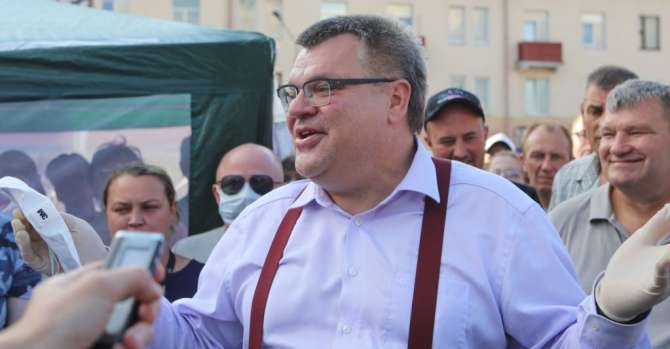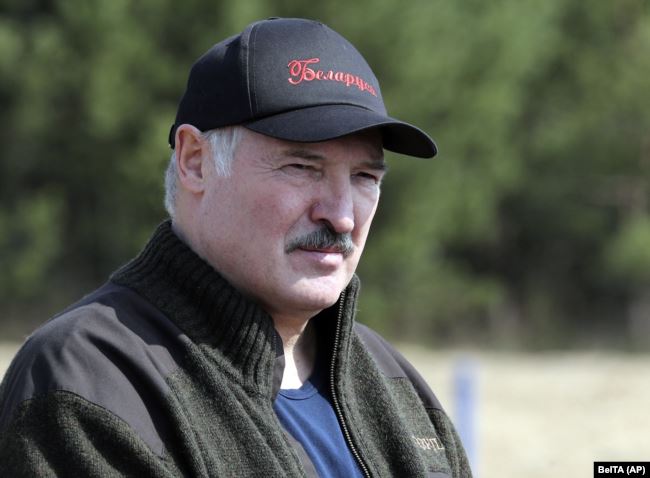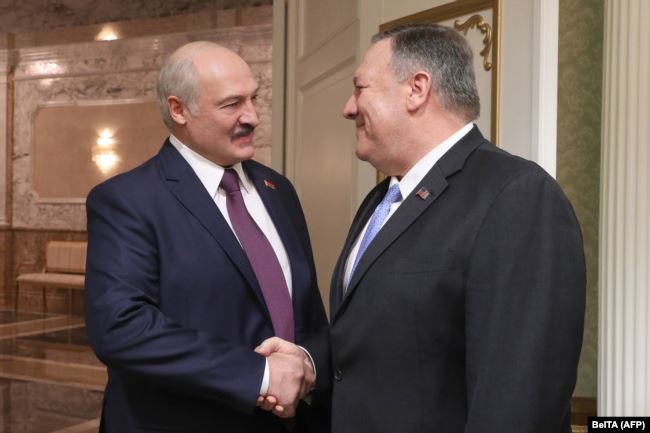In Belarus, Pre-Vote Clampdown Spreads From Streets And Blogs To A Bank
Tony Wesolowsky, Rferl
16 June 2020, 22:51
 In past elections in Belarus, political battles have played out on the streets, with the government cracking down on protesters who were calling for free and fair votes or crying foul when the official results handed President Alyaksandr Lukashenka yet another term.
In past elections in Belarus, political battles have played out on the streets, with the government cracking down on protesters who were calling for free and fair votes or crying foul when the official results handed President Alyaksandr Lukashenka yet another term.
The fight over an August 9 election is shaping up in a similar way: More than 100 activists, bloggers, and other foes of Lukashenka have been detained amid protests around the country, including potential candidates like popular vlogger Syarhey Tsikhanouski and opposition politician Mikalay Statkevich, who challenged the authoritarian leader in 2010 and was imprisoned for protests that followed that disputed vote.
But this time, the threat to Lukashenka appears greater, as he struggles to tamp down anger over what critics call a disastrous response to the coronavirus pandemic and growing concerns about the economy in a country whose government has long relied on subsidies from Russia in the form of discounts on oil supplies.
And this time he is casting the net wider, analysts say, targeting a banker whose campaign to unseat the president in power since 1994 has been gaining momentum.
On June 15, the Belarusian authorities took control of Belgazprombank, an almost entirely Russian-owned commercial bank that was led for 20 years by Viktar Babaryka before he stepped down to seek the presidency.
That move came a day after law enforcement officers carried out searches and arrested 15 of the bank's executives, citing suspicions of tax evasion and money laundering.
Babaryka, 56, who has not been arrested, has denied any wrongdoing at the bank and called the actions part of an intimidation campaign conducted on "political orders."
Before a crowd of some 300 people at a signature-gathering event in the city of Babruysk on June 15, he hammered home one of his campaign messages: a claim that Lukashenka's government has covered up the full scope of the COVID-19 crisis in Belarus.
"The truth is that each of us, when we leave our home, confronts what is really going on in the country -- the real mess we are in," Babaryka said. He accused the government of "deceiving its own people" by "telling us everything is fine."
In March, Lukashenka dismissed the coronavirus pandemic as a product of "mass psychosis," and declined to impose measures meant to rein it in, such as lockdowns and social-distancing rules. Now the nation of 9.5 million has one of Europe's highest per capita infection rates, with more than 55,000 confirmed cases according to an official count.
The economy has been hit by COVID-19 as well as simmering tension with Russia, which has moved to tighten the financial screws on Belarus as Lukashenka has appeared to resist Moscow's calls for closer integration, which many in Belarus fear could mean a loss of sovereignty.
The World Bank is predicting that the Belarusian economy will contract by at least 4 percent in 2020, which it said would be the largest decline in 25 years.
Against this backdrop, several would-be presidents are seeking to challenge Lukashenka, who has retained power through series of elections and other votes that international observers say have fallen short of democratic standards in every case. Well-attended signature drives in cities across Belarus have pointed up what may be unprecedented public dissatisfaction with his rule.
Babaryka says he has gathered more than 300,000 signatures, three times the amount required to get on the ballot. That is probably an unpleasant surprise for Lukashenka, according to Kamil Klysinski, a senior fellow at the Warsaw-based OSW Center for Eastern Studies.
"More than 300,000 is unprecedented in Belarusian terms for any alternative candidate," Klysinski said. "Lukashenka may fear Babaryka as a too-popular candidate, with quite a decent budget, a big and well organized [campaign] committee, and -- last but not least -- many connections with the Belarusian nomenklatura."
Babaryka is not the only Belarusian businessman seeking to challenge Lukashenka. Valer Tsapkala, a former ambassador to the United States and the ex-head of a high-tech incubator in Minsk, is also a presidential hopeful.
Lukashenka, 65, has largely dismissed potential rival candidates, comparing them to "beetles" feeding on fodder laid down by others.
![In Belarus, Pre-Vote Clampdown Spreads From Streets And Blogs To A Bank]()
Public support for Lukashenka is hard to gauge because no widespread polling has been done in five years, Ihar Ilyash, a Belarusian political analyst, told Current Time, a Russian-language network led by RFE/RL in cooperation with VOA. He asserted that informal online polls have put Lukashenka's ratings in the single digits and far below Babaryka's.
Although Babaryka has not been charged with any crimes, the Department of Financial Investigation of the Belarusian State Control Committee claimed on June 12 it had proof of his involvement in illegal activity.
Then came the June 15 announcement that the state had taken control of Belgazprombank, which is majority owned by Russian state-controlled natural-gas giant Gazprom and Gazprombank, an affiliate.
The Russian owners had criticized the Belarusian authorities' searches and arrests at Belgazprombank the previous day, calling the actions a "gross violation" of Belarusian law and the rules of the Eurasian Economic Union, a trade grouping that includes Russia, Belarus, Kazakhstan, Armenia, and Kyrgyzstan.
Facing challenges on several fronts, Lukashenka can little afford now to further escalate tensions with Russia, said Klysinski. He predicted the situation would be discussed when Russian Foreign Minister Sergei Lavrov visits Minsk on June 19.
"I believe that Lukashenka is not interested in a new stage of conflict with Moscow, so they will look for some solution on that," Klysinski said.
Lukashenka's actions have also raised concerns in the West, which has improved ties with Minsk in recent years to temper Russia's influence.
On June 5, a group of UN experts expressed "serious concern about an intensified crackdown on civil society in Belarus."
In May, at least 195 people -- notably human rights defenders, journalists, bloggers, medical workers and other members of civil society -- were arrested for having expressed their views, the experts said.
"We are gravely concerned that these arrests that are connected with the exercise of the fundamental freedoms of peaceful assembly and freedom of opinion and expression have a chilling effect on civil society, independent journalism, and the unhampered expression of dissenting views," said Anaïs Marin, the UN Special Rapporteur on the human rights situation in Belarus.
On June 11, U.S. President Donald Trump's administration announced it was extending sanctions on several Belarusian officials, including Lukashenka, for another year.
"The actions and policies of certain members of the Government of Belarus and other persons to undermine Belarus's democratic processes or institutions, to commit human rights abuses related to political repression, and to engage in public corruption continue to pose an unusual and extraordinary threat to the national security and foreign policy of the United States," a White House statement read.
![]()
The move comes despite a recent warming of ties. U.S. Secretary of State Mike Pompeo visited Minsk in February, the most senior U.S. official to travel to Belarus in more than two decades. In April, the two countries formally reestablished diplomatic relations when Julie Fisher was nominated U.S. ambassador to Belarus -- a position that has been vacant for more than a decade. Belarus has also bought U.S. oil in a historical first.
So far, there has been no letup in the pressure on businesses and people associated with Babaryka. Independent Belarusian media reported June 16 that Svyatlana Kupreyeva, a member of Babaryka's campaign team, was detained on June 11 and is now being held at a KGB detention center. It was unclear what charges or allegations she could be facing. https://babariko.by/news/informacziya-o-zaderzhaniyah-chlenov-inicziativnyh-grupp
Ilyash said that Lukashenka was trying to keep Babaryka on a "short leash…so that he does not convert his high electoral rating into protest activity on the streets -- that is, he does not try to organize mass protests."
"This is exactly what the government is afraid of," he said. "This is Lukashenka's main fear."
16 June 2020, 22:51

Former banker Viktar Babyrka on the campaign trail in the city of Babruysk on June 15.
The fight over an August 9 election is shaping up in a similar way: More than 100 activists, bloggers, and other foes of Lukashenka have been detained amid protests around the country, including potential candidates like popular vlogger Syarhey Tsikhanouski and opposition politician Mikalay Statkevich, who challenged the authoritarian leader in 2010 and was imprisoned for protests that followed that disputed vote.
But this time, the threat to Lukashenka appears greater, as he struggles to tamp down anger over what critics call a disastrous response to the coronavirus pandemic and growing concerns about the economy in a country whose government has long relied on subsidies from Russia in the form of discounts on oil supplies.
And this time he is casting the net wider, analysts say, targeting a banker whose campaign to unseat the president in power since 1994 has been gaining momentum.
On June 15, the Belarusian authorities took control of Belgazprombank, an almost entirely Russian-owned commercial bank that was led for 20 years by Viktar Babaryka before he stepped down to seek the presidency.
That move came a day after law enforcement officers carried out searches and arrested 15 of the bank's executives, citing suspicions of tax evasion and money laundering.
Babaryka, 56, who has not been arrested, has denied any wrongdoing at the bank and called the actions part of an intimidation campaign conducted on "political orders."
Before a crowd of some 300 people at a signature-gathering event in the city of Babruysk on June 15, he hammered home one of his campaign messages: a claim that Lukashenka's government has covered up the full scope of the COVID-19 crisis in Belarus.
The COVID-19 Factor
"The truth is that each of us, when we leave our home, confronts what is really going on in the country -- the real mess we are in," Babaryka said. He accused the government of "deceiving its own people" by "telling us everything is fine."
In March, Lukashenka dismissed the coronavirus pandemic as a product of "mass psychosis," and declined to impose measures meant to rein it in, such as lockdowns and social-distancing rules. Now the nation of 9.5 million has one of Europe's highest per capita infection rates, with more than 55,000 confirmed cases according to an official count.
The economy has been hit by COVID-19 as well as simmering tension with Russia, which has moved to tighten the financial screws on Belarus as Lukashenka has appeared to resist Moscow's calls for closer integration, which many in Belarus fear could mean a loss of sovereignty.
The World Bank is predicting that the Belarusian economy will contract by at least 4 percent in 2020, which it said would be the largest decline in 25 years.
Against this backdrop, several would-be presidents are seeking to challenge Lukashenka, who has retained power through series of elections and other votes that international observers say have fallen short of democratic standards in every case. Well-attended signature drives in cities across Belarus have pointed up what may be unprecedented public dissatisfaction with his rule.
Babaryka says he has gathered more than 300,000 signatures, three times the amount required to get on the ballot. That is probably an unpleasant surprise for Lukashenka, according to Kamil Klysinski, a senior fellow at the Warsaw-based OSW Center for Eastern Studies.
Meet The 'Beetles'?
"More than 300,000 is unprecedented in Belarusian terms for any alternative candidate," Klysinski said. "Lukashenka may fear Babaryka as a too-popular candidate, with quite a decent budget, a big and well organized [campaign] committee, and -- last but not least -- many connections with the Belarusian nomenklatura."
Babaryka is not the only Belarusian businessman seeking to challenge Lukashenka. Valer Tsapkala, a former ambassador to the United States and the ex-head of a high-tech incubator in Minsk, is also a presidential hopeful.
Lukashenka, 65, has largely dismissed potential rival candidates, comparing them to "beetles" feeding on fodder laid down by others.

Belarusian President Alyaksandr Lukashenka (file photo)
Public support for Lukashenka is hard to gauge because no widespread polling has been done in five years, Ihar Ilyash, a Belarusian political analyst, told Current Time, a Russian-language network led by RFE/RL in cooperation with VOA. He asserted that informal online polls have put Lukashenka's ratings in the single digits and far below Babaryka's.
Although Babaryka has not been charged with any crimes, the Department of Financial Investigation of the Belarusian State Control Committee claimed on June 12 it had proof of his involvement in illegal activity.
Then came the June 15 announcement that the state had taken control of Belgazprombank, which is majority owned by Russian state-controlled natural-gas giant Gazprom and Gazprombank, an affiliate.
The Russian owners had criticized the Belarusian authorities' searches and arrests at Belgazprombank the previous day, calling the actions a "gross violation" of Belarusian law and the rules of the Eurasian Economic Union, a trade grouping that includes Russia, Belarus, Kazakhstan, Armenia, and Kyrgyzstan.
Facing challenges on several fronts, Lukashenka can little afford now to further escalate tensions with Russia, said Klysinski. He predicted the situation would be discussed when Russian Foreign Minister Sergei Lavrov visits Minsk on June 19.
"I believe that Lukashenka is not interested in a new stage of conflict with Moscow, so they will look for some solution on that," Klysinski said.
Lukashenka's actions have also raised concerns in the West, which has improved ties with Minsk in recent years to temper Russia's influence.
On June 5, a group of UN experts expressed "serious concern about an intensified crackdown on civil society in Belarus."
In May, at least 195 people -- notably human rights defenders, journalists, bloggers, medical workers and other members of civil society -- were arrested for having expressed their views, the experts said.
U.S. Sanctions
"We are gravely concerned that these arrests that are connected with the exercise of the fundamental freedoms of peaceful assembly and freedom of opinion and expression have a chilling effect on civil society, independent journalism, and the unhampered expression of dissenting views," said Anaïs Marin, the UN Special Rapporteur on the human rights situation in Belarus.
On June 11, U.S. President Donald Trump's administration announced it was extending sanctions on several Belarusian officials, including Lukashenka, for another year.
"The actions and policies of certain members of the Government of Belarus and other persons to undermine Belarus's democratic processes or institutions, to commit human rights abuses related to political repression, and to engage in public corruption continue to pose an unusual and extraordinary threat to the national security and foreign policy of the United States," a White House statement read.

Belarusian President Alyaksandr Lukashenka (left) meets with U.S. Secretary of State Mike Pompeo in Minsk on February 1.
The move comes despite a recent warming of ties. U.S. Secretary of State Mike Pompeo visited Minsk in February, the most senior U.S. official to travel to Belarus in more than two decades. In April, the two countries formally reestablished diplomatic relations when Julie Fisher was nominated U.S. ambassador to Belarus -- a position that has been vacant for more than a decade. Belarus has also bought U.S. oil in a historical first.
So far, there has been no letup in the pressure on businesses and people associated with Babaryka. Independent Belarusian media reported June 16 that Svyatlana Kupreyeva, a member of Babaryka's campaign team, was detained on June 11 and is now being held at a KGB detention center. It was unclear what charges or allegations she could be facing. https://babariko.by/news/informacziya-o-zaderzhaniyah-chlenov-inicziativnyh-grupp
Ilyash said that Lukashenka was trying to keep Babaryka on a "short leash…so that he does not convert his high electoral rating into protest activity on the streets -- that is, he does not try to organize mass protests."
"This is exactly what the government is afraid of," he said. "This is Lukashenka's main fear."

